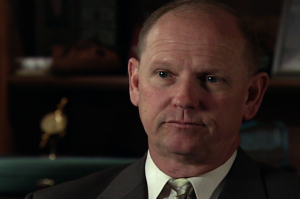When reporters from Moyers on America visited Lafayette, Louisiana in 2006, residents and officials had taken on the phone and cable companies to build their own fiber-optic broadband network after the firms refused to bring true broadband connections to the community. BellSouth — an AT&T company — and Cox Communications lobbied the state legislature to block Lafayette’s plan, citing unfair competition. Ultimately, lawmakers voted to let residents decide. The measure allowing the community-built network passed overwhelmingly. BellSouth then filed suit, delaying construction by more than a year, before losing their case in court.
Watch what happened in Lafayette and what officials hoped a fiber-optic network might mean for their community.
In 2009, the city’s fiber network came online and by 2012 it was paying for itself. In an interview this week, City-Parish President Joey Durel predicted that soon, the fiber network may actually turn a profit for the city. Lafayette — about two hours’ drive west of New Orleans, deep in the heart of Cajun country — now offers residents and businesses one of the fastest Internet connections in the nation, with speeds up to 100 megabytes per second, about four-to-five times faster than broadband connections in most of America.
The FCC recently endorsed controversial plans to provide high-speed Internet to cities across America. At the core of the debate is a discussion over whether Internet access should be provided by government, like water and sewage utilities, or sold by private sector telecommunications companies.
In Lafayette, “The common argument was — because we’ve all been taught this in civics — that government shouldn’t compete in the private sector,” says Durel, a Republican and former chairman of the Greater Lafayette Chamber of Commerce, who entered office in 2004 as a first-time politician. “And I saw this as not so much government competing with the private sector — I told my citizens, I didn’t see BellSouth as the private sector. I read somewhere that they got more government subsidies at that time than any other corporation in America. That’s quasi-government, in my opinion. That’s not the little shoe store on Main Street.
“I saw [fiber] as very positive for business,” Durel continued. “Just not real positive for the monopolies that were fighting us.”
Since Lafayette’s fiber network has come online, the city has attracted numerous entrepreneurs and businesses, including programmers, engineering firms, a visual effects house from California and an oil-related technology company from Houston. But Durel believes it would be much harder today for cities — including Lafayette — to build the network they started in 2007. Politicians are more “weak-kneed,” he says, and the corporate opposition is stronger.
“One town I went to was very interested,” Durel recalled, “[but] the president of their chamber of commerce was the president of [telecommunications company] Qwest in that state. When I left, I said, ‘Ain’t no way they’re going to get that support from their Chamber of Commerce.’”
According to the media reform group Free Press, 19 states have passed legislation that prohibits municipalities from competing with phone and cable companies the way Lafayette did. Some of those laws are based on “model legislation” authored by ALEC.
“They’re putting their states at competitive disadvantages,” says Durel. “They’re bolstering up the monopolies to not have to invest.”
“I think that 80 percent of America will not have what we have today 20 years from now.”


